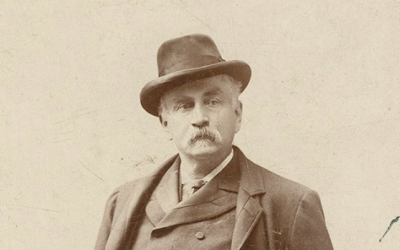Nebraska’s gubernatorial race in 1892 was a four-way contest. The candidates were Republican Lorenzo Crounse, Democrat J. Sterling Morton, Populist Charles H. Van Wyck, and prohibitionist C. E. Bentley. Crounse, a judge and former Nebraska congressman, was the winner with 78,426 votes. Van Wyck received 68,617; Morton, 44,195; and Bentley, 6,235.
Morton had not actively sought the nomination in 1892. However, the incumbent Democratic governor, James E. Boyd, had lost much of his popularity with party members and did not wish to run for reelection. With Boyd out of the picture, Morton seemed the only logical choice. Although he refused to formally announce his candidacy, Morton did let it be known that he would accept the nomination for governor if it were tendered unanimously by delegates to the state Democratic convention, held August 30, 1892, in Lincoln. The nomination was so offered, and Morton accepted.
Crounse, Van Wyck, and Morton waged aggressive campaigns. Morton concentrated his attacks not on Crounse, but on Van Wyck. The Democratic platform in 1892 did not include a plank on silver, and Morton felt free to oppose it. However, Democrat William Jennings Bryan, running for reelection to Congress, favored it. Morton suspected that some members of his own party were working against him on behalf of the popular Bryan. James C. Olson, Morton’s biographer, noted:
“It seemed that in Congressman Bryan’s district, Democrats were promising to vote for Van Wyck for governor, if only the Populists would vote for the Democratic candidate for congress. The center of disaffection was Lincoln, Bryan’s home and the most populous town in the district. There Bryan’s friends, claiming that Morton’s speeches on silver were really directed against the Congressman, declared quite freely their intention to vote for Van Wyck. . . . The results of the election confirmed Morton’s opinion that Bryan’s friends were trading him for Van Wyck.”
However, Morton’s career was not ended with his defeat for governor in 1892. His party loyalty and adherence to principle impressed the newly elected Democratic president, Grover Cleveland, who appointed Morton secretary of Agriculture in 1893.



